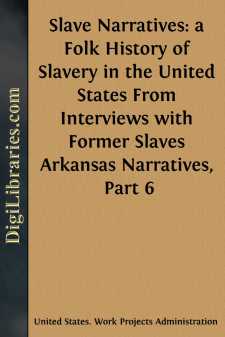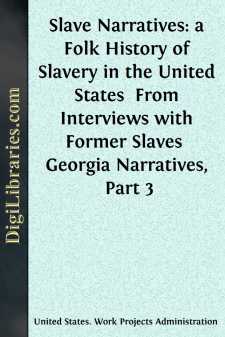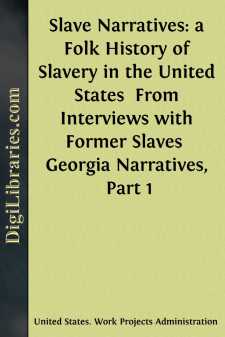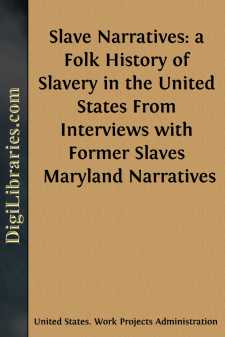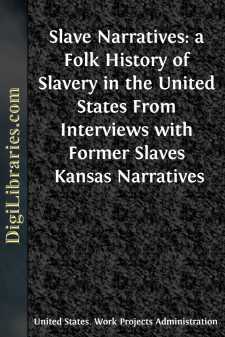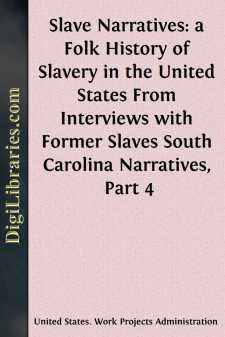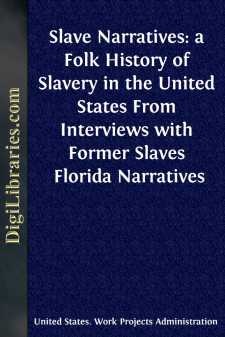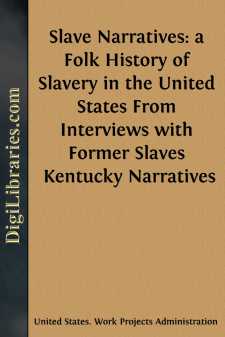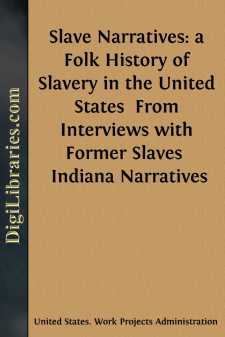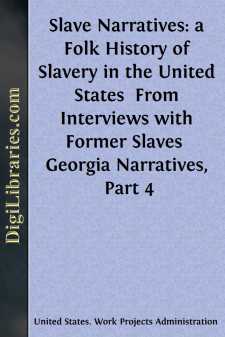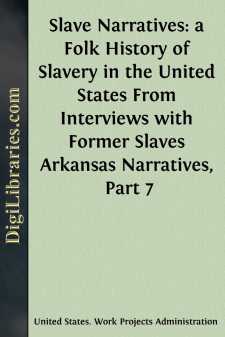Categories
- Antiques & Collectibles 13
- Architecture 36
- Art 48
- Bibles 22
- Biography & Autobiography 813
- Body, Mind & Spirit 142
- Business & Economics 28
- Children's Books 17
- Children's Fiction 14
- Computers 4
- Cooking 94
- Crafts & Hobbies 4
- Drama 346
- Education 46
- Family & Relationships 57
- Fiction 11829
- Games 19
- Gardening 17
- Health & Fitness 34
- History 1377
- House & Home 1
- Humor 147
- Juvenile Fiction 1873
- Juvenile Nonfiction 202
- Language Arts & Disciplines 88
- Law 16
- Literary Collections 686
- Literary Criticism 179
- Mathematics 13
- Medical 41
- Music 40
- Nature 179
- Non-Classifiable 1768
- Performing Arts 7
- Periodicals 1453
- Philosophy 64
- Photography 2
- Poetry 896
- Political Science 203
- Psychology 42
- Reference 154
- Religion 513
- Science 126
- Self-Help 84
- Social Science 81
- Sports & Recreation 34
- Study Aids 3
- Technology & Engineering 59
- Transportation 23
- Travel 463
- True Crime 29
Slave Narratives: a Folk History of Slavery in the United States From Interviews with Former Slaves Arkansas Narratives, Part 6
Categories:
Description:
Excerpt
Texarkana District
FOLKLORE SUBJECTS
Name of Interviewer: Cecil Copeland
Subject: Social Customs—Reminiscences of an Ex-Slave
Subject: Foods
This Information given by: Doc Quinn
Place of Residence: 1217 Ash Street, Texarkana, Arkansas
Occupation: None [TR: also reported as Ex-slave.]
Age: 93 [TR: also reported as 94.]
[TR: Information moved from bottom of first page.]
[TR: Repetitive information deleted from subsequent pages.]
Several months ago, I called at 1217 Ash Street, Texarkana, Arkansas where I had been informed a voluble old negro lived. An aged, gray-haired, negro woman came to the door and informed me her father was in the wood shed at the back of the house. Going around to the wood shed I found him busily engaged in storing his winter supply of wood. When I made known my mission he readily agreed to answer all my questions as best he could. Seating himself on a block of wood, he told this almost incredible story, along with lengthy discourses on politics, religion and other current events:
"I wuz born March 15, 1843, in Monroe County, Mississippi, near Aberdeen, Mah Mahster wuz Colonel Ogburn, one ob de bigges' planters in de state of Mississippi. Manys de time he raised so much cotton dat dem big steamers just couldnt carry it all down to N'Awlins in one year. But den along came de Civil War an' we didn't raise nothin' fo' several years. Why? Becase most uf us jined the Confederate Army in Colonel Ogburn's regiment as servants and bodyguards. An' let me tell yo' somethin', whitefolks. Dere never wuz a war like dis war. Why I 'member dat after de battle of Corinth, Miss., a five acre field was so thickly covered wid de dead and wounded dat yo' couldn't touch de ground in walkin' across it. And de onliest way to bury dem wuz to cut a deep furrow wid a plow, lay de soldiers head to head, an' plow de dirt back on dem."
"About a year after de war started de Mahster got one ob dese A.W.O.L.'s frum de Army so we could come to Miller County, where he bought de place on Red River now known as de Adams Farm."
"When we fust came here dis place, as well as de rest ob de Valley, wuz just a big canebrake—nothin' lived in dere but bears, wolves, and varmints. Why de Mahster would habe to round up de livestock each afternoon, put dem in pens, and den put out guards all night to keep de wolves and bears frum gettin' em. De folks didn't go gallivatin' round nights like dey do now or de varmints would get them. But den we didn't stay here but a few months until de Mahster's A.W.O.L. wuz up, so we had to go back and jine de army. We fought in Mississippi Alabama, Georgia, and South Carolina."
"When de war ended de Mahster moved us to Miller County, but not on de Adams farm. For de man whut used to own de farm said Uncle Sam hadn't made any such money as wuz paid him for de farm, so he wanted his farm back. Dat Confederate money wuzn't worth de paper it wuz printed on, so de Mahster had to gib him back de farm. Poor Massa Ogburn—he didn't live long after dat. He and his wife are buried side by side in Rondo Cemetery."
"Not long after de negroes wuz freed, I took 86 ob dem to de votin' place at Homan and voted 'em all straight Democratic. On my way back home dat evenin' five negroes jumped frum de bushes and stopped me. Dey 'splained dat I wuz too 'fluential wid de negroes and proceeded to string me up by de neck....


